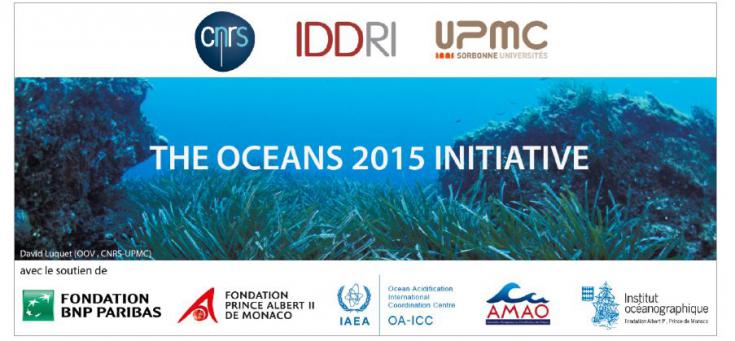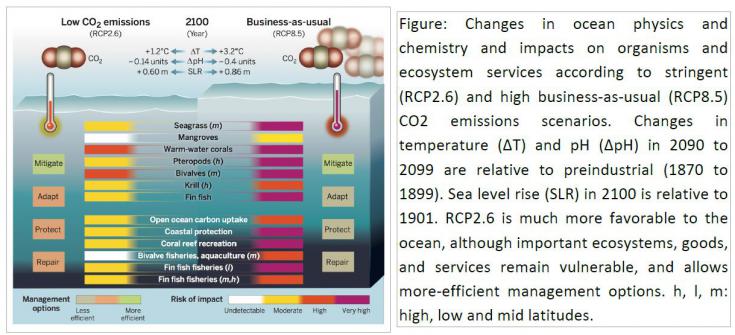The ocean moderates anthropogenic atmospheric warming at the cost of profound alterations of its physics, chemistry, ecology, and ecosystem services. The Oceans 2015 Initiative has published a paper in Science evaluating and comparing the risks of impacts on marine and coastal ecosystems and the goods and services they provide under two potential carbon dioxide (CO2) emissions pathways over this century. Jean‐Pierre Gattuso, Senior Scientist at CNRS and lead author of the paper says “the oceans have been minimally considered at previous climate negotiations; our study provides compelling arguments for a radical change at COP21”.
Atmospheric CO2 has increased by more than 40% over the industrial period, which has driven a series of major environmental changes. Yet, the global ocean is a “climate integrator’’ that (1) absorbed 93% of the earth’s additional heat since the 1970s, keeping the atmosphere cooler but increasing ocean temperature and rising sea level; (2) captured 28% of human-‐caused CO2 emissions since 1750, but acidifying the ocean; and (3) collected virtually all water from melting ice, furthering sea-‐level rise.
From moderate to very high risks
Ocean changes associated with a stringent emissions pathway —i.e., consistent with the Copenhagen Accord’s goal of a global atmospheric temperature increase of less than 2°C by 2100— already carries high risks of impacts for warm-‐water corals and mid-‐latitude bivalves. The risk of other impacts will remain moderate if we do not exceed this scenario. Higher emissions pathways, such as the business-‐as-‐usual path we are currently following, would greatly aggravate the situation: almost all marine organisms the Oceans 2015 Initiative team considered (e.g., corals, pteropods, finfish, and krill) would face very high risk of impact, such as mass mortalities or species displacement. Likewise, the risk of impact on ecosystem services such as coastal protection (e.g., by oyster beds, coral reefs and mangroves), aquaculture, tourism and capture fisheries would become high or very high by 2100. For example, substantial declines for tropical fisheries are projected as soon as mid 21st century, even under low-‐emissions pathways. This study also shows that the policy options to address ocean impacts (mitigate, protect, repair, adapt) narrow as the ocean warms and acidifies, i.e. as the world moves away from the +2°C path. For example, one cannot manage coral reef resilience if there is no healthy reefs remaining. Some options are also antagonistic, for example, solar radiation management could limit the increase in temperature but would reduce the incentive to cut CO2 emissions, thereby providing no relief from ocean acidification. “Given the extent of the expected changes, no country is in a safe position, making this issue a worldwide problem that challenges the traditional North/South divide”, said Alexandre Magnan, scientist at IDDRI and coauthor of the paper.
Push to consider ocean issues at COP21
Four key messages are articulated. (1) The ocean strongly influences the climate system and provides important services to humans. (2) Impacts on key marine and coastal organisms, ecosystems, and services from anthropogenic CO2 emissions are already detectable across various latitudes, and several will face high risk of impacts well before 2100, even with stringent CO2 emissions scenarios. (3) Immediate and substantial reduction of CO2 emissions is required more than ever to prevent massive and effectively irreversible impacts on ocean ecosystems and their services. (4) As CO2 increases, the protection, adaptation and repair options for the ocean become fewer and less effective.
Given the contrasting futures outlined in this paper, the ocean provides further compelling arguments for rapid, rigorous and ambitious CO2 emissions reductions. Any new global climate agreement that does not minimize the impacts on the ocean will be incomplete and inadequate.
Source: Gattuso J.-‐P., Magnan A., Billé R., Cheung W. W. L., Howes E. L., Joos F., Allemand D., Bopp L., Cooley S., Eakin C. M., Hoegh-‐Guldberg O., Kelly R. P., Pörtner H.-‐O., Rogers A. D., Baxter J. M., Laffoley D., Osborn D., Rankovic A., Rochette J., Sumaila U. R., Treyer S. & Turley C., 2015. Contrasting futures for ocean and society from different anthropogenic CO2 emissions scenarios. Science.
For editors: The Oceans 2015 Initiative was launched to provide COP21 negotiators with key information on how the future ocean will look like. It is led by CNRS-‐UPMC and IDDRI and is supported by the Prince Albert II of Monaco Foundation, the Ocean Acidification International Coordination Centre of the International Atomic Energy Agency, the BNP Paribas Foundation and the Monégasque Association for Ocean Acidification.
Special Notes to Reporters: Photographs and an animated movie are available here. More information, including a copy of the paper, can be found online at the Science press package. You will need your user ID and password to access this information. Alternatively, contact the Science press package team at +202-‐326-‐6440 or scipak [at] aaas (dot) org.
The Centre National de la Recherche Scientifique (National Center for Scientific Research) is the main public organization in France and Europe, under the responsibility of the French Ministry of Education and Research. Founded in 1939, CNRS has the following missions: (1) Valuate and carry out all research capable of advancing knowledge and bringing social, cultural, and economic benefits for society. (2) Contribute to the application and promotion of research results. (3) Develop scientific information. (4) Support research training. (5) Participate in the analysis of the national and international scientific climate and its potential for evolution in order to develop a national policy. As the largest fundamental research organization in Europe, CNRS carried out research in all fields of knowledge, through its ten institutes, including the National Institute for Earth Sciences and Astronomy (INSU). CNRS encourages collaboration between specialists from different disciplines in particular with the university thus opening up new fields of enquiry to meet social and economic needs. CNRS has developed interdisciplinary programs which bring together various CNRS departments as well as other research institutions and industry.
The Institute for Sustainable Development and International Relations (IDDRI) is a non-‐profit policy research institute based in Paris. Its objective is to determine and share the keys for analyzing and understanding strategic issues linked to sustainable development. IDDRI helps stakeholders in deliberating on global governance of the major issues of common interest: action to attenuate and adapt to climate change, to protect biodiversity, to enhance food security, to manage urbanisation, to protect the oceans, to enhance new prosperity forms and, more generally, to reframe development pathways. As a non-‐profit research institution acting for the common good, the institute posts all of its
About UPMC
UPMC is the direct heiress of the Faculty of Science of the Sorbonne. It is the leader in France in science and medicine. Research at UPMC extends from fundamental to applied and mobilizes all areas of knowledge. The university explores the major issues of sustainable development in health, climate change, water, biodiversity, energy and communications. UPMC is a key player in the development of knowledge and innovation: it supports the research results with the SATT Lutech, Agoranov (incubation of start-‐ups) and Quadrivium (venture capital). It has exceptional institutes in vision, neuroscience, degenerative diseases, heart diseases related to metabolism, immunology and infectious diseases, cancer and public health. UPMC is also a part of the Sorbonne University community institutions. With the perspective of COP21, Sorbonne University and UPMC organize throughout the year 2015 various events (seminars, conferences...) whose central theme is climate. 2,000 research professors, researchers, PhD students and engineers work in the field of environment and climate at Sorbonne University and have expertise to share. SU and UPMC thus prepare in their own way the COP21.
Key numbers:
33,909 students, 6,208 researchers and teacher-‐researchers, 100 research laboratories
No 1 University in France; No 6 University in Europe and No 4 in the world for mathematics in the Taiwan & Shanghai rankings
About Prince Albert II of Monaco Foundation
In June 2006, HSH Prince Albert II of Monaco decided to set up his Foundation in order to address the alarming threats hanging over our planet’s environment. The Prince Albert II of Monaco Foundation works for the protection of the environment and the promotion of sustainable development. The Foundation supports projects in three main geographical regions: the Mediterranean Basin, the Polar Regions and the Least Developed Countries. The Foundation’s efforts focus on three main sectors: Climate change and renewable energies, biodiversity, and integrated and sustainable water management together with the fight against desertification. In the area of climate change the Foundation supports action related to energy efficiency and the fight against deforestation. It also explores emerging issues such as the link between the ocean and the climate, and more particularly ocean acidification, blue carbon and the role of marine protected areas in adaptation to and mitigation of climate change.
Developed by the International Atomic Energy Agency (IAEA) and supported through its “Peaceful Uses Initiative”, the Ocean Acidification International Coordination Centre (OA-‐ICC) works to communicate, promote and facilitate global actions in a changing ocean world, while involving all ocean acidification actors and stakeholders (scientific community, policy makers, media, and general public).
About la Fondation BNP Paribas
Under the aegis of the Fondation de France, the BNP Paribas Foundation has been playing a key role in corporate philanthropy for 30 years. It is also encouraging and contributing to the BNP Paribas’ philanthropic policy growth in all parts of the world where the Group does business.
The BNP Paribas Foundation’s activities are aimed at promoting innovative projects dedicated to culture, social inclusion and the environment. It is paying close attention to provide optimal support to its partners, through a long-‐term commitment. Dialogue, loyal support and a relationship based on trust are the hallmarks of its involvement.
Since it was set up in 1984, more than 300 cultural projects, 40 scientific research programmes and around one thousand social and educational initiatives have benefited from its support, in France and across the world.
About the Climate Initiative programme
The BNP Paribas Foundation is providing assistance to SUBGLACIOR as part of the Climate Initiative, a corporate philanthropy programme for research into climate change launched by the Foundation in 2010, in close liaison with the BNP Paribas Group CSR department. A total of ten climate change research projects have received, or are currently receiving, financial support under the Climate Initiative.
The Prince Albert II of Monaco Foundation was the instigator of the Monegasque Association for Ocean Acidification (AMAO; Association Monégasque pour l’Acidification des Océans). Its actual establishment was publicly declared by HSH the Sovereign Prince during his speech on 3rd December 2013 on the occasion of the Ocean Acidification International Reference User Group meeting. The goals of the AMAO are to communicate on, promote and facilitate international actions on ocean acidification and other global stress factors affecting the marine environment. The AMAO is committed to homogenise communication between the various institutions working in Monaco to combat ocean acidification: the Prince Albert II Foundation and the Government of Monaco, the Environmental Laboratories of the International Atomic Energy Agency, the Monaco Scientific Centre and the Oceanographic Institute of Monaco. Moreover it comprises representatives of the International Union for Conservation of Nature and the CNRS, French National Research Centre.

